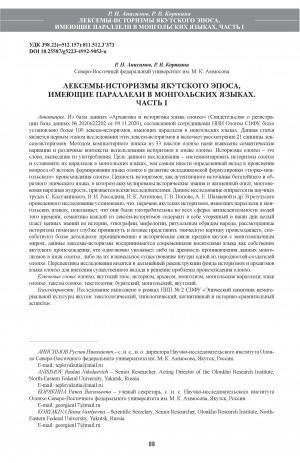Место работы автора, адрес/электронная почта: Северо-Восточный федеральный университет им. М. К. Аммосова, Научно-исследовательский институт Олонхо ; 677007, г. Якутск, ул. Кулаковского, 42, каб. 101 ; e-mail: rv.koryakina@s-vfu.ru ; http://iolonkho.s-vfu.ru/
Область научных интересов: Лингвистика, литература, эпос, культурология
ID Автора: SPIN-код: 7981-5871, РИНЦ AuthorID: 969062
Количество страниц: 12 с.
- Языкознание. Филология. Художественная литература > Языкознание и языки. Лингвистика > Якутский (саха),
- Языкознание. Филология. Художественная литература > Языкознание и языки. Лингвистика > Другие языки,
- НАУКА ЯКУТИИ > ЯЗЫКОЗНАНИЕ. ФИЛОЛОГИЯ. ЛИТЕРАТУРОВЕДЕНИЕ. ХУДОЖЕСТВЕННАЯ ЛИТЕРАТУРА > Языкознание и языки. Лингвистика.
This paper examines the “metallic” epithets in the Yakut Olonkho and Altai kai chӧrchӧk in a comparative aspect in order to reveal the parallels and specific features of the functioning of these epithets in the epic of peoples related in the historical past. The following methods were used: contextual analysis, analysis of dictionary definitions, quantitative methods, and the inductive method, which allows generalizing the results of applying all the methods. The comparative study revealed many similarities. In both epics, metal epithets in the structure are radical, derived from the lexeme denoting the name of the metal. In a denotative meaning, they characterize objects by the material from which they are made. The choice of specific metallic epithets as contextual synonyms in the structure of the epic formula is due to the phenomenon of vowel harmony inherent in most Turkic languages. The genetic community of the Yakut and Altai peoples probably explains the similar features of the metallic epithets. Also, the differences have been established: according to the frequency of using the epithets formed from the nominations of precious metals, the ancient Yakuts preferred silver, and the Altai people preferred gold. The differences and peculiarities of functioning of “metal” epithets in the Yakut and Altai epic texts can be explained by the stage difference in the development of the epic texts compared.
Корякина, Р. В. Особенности функционирования одного эпитета в якутском и алтайском эпических текстах / Р. В. Корякина ; Северо-Восточный федеральный университет им. М. К. Аммосова // Сибирский филологический журнал. - 2022. - N 1. - С. 36-47. - DOI: 10.17223/18137083/78/3
DOI: 10.17223/18137083/78/3
Количество страниц: 22 с.
- Языкознание. Филология. Художественная литература > Языкознание и языки. Лингвистика > Якутский (саха),
- Общественные науки. Образование > Фольклор,
- НАУКА ЯКУТИИ > ОБЩЕСТВЕННЫЕ НАУКИ > Фольклор,
- НАУКА ЯКУТИИ > ЯЗЫКОЗНАНИЕ. ФИЛОЛОГИЯ. ЛИТЕРАТУРОВЕДЕНИЕ. ХУДОЖЕСТВЕННАЯ ЛИТЕРАТУРА > Языкознание и языки. Лингвистика.
Анисимов, Р. Н. Лексемы-историзмы якутского эпоса, имеющие параллели в монгольских языках. Часть I / Р. Н. Анисимов, Р. В. Корякина // Вестник Северо-Восточного федерального университета им. М. К. Аммосова. Серия "Эпосоведение" - 2021, N 3 (23). - С. 88-109.
DOI: 10.25587/g5223-4992-9053-u
Количество страниц: 7 с.
Корякина, Р. В. Эпитет "хара" черный в якутском олонхо / Корякина Раиса Васильевна // Эпическое наследие народов Якутии: традиции и современность. — Якутск, 2018. — С. 55-61.


